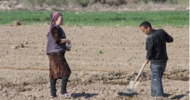In Ethiopia, some 43 firms have acquired agricultural land but scores of these have already left the sector, while 16 of them are currently under probation.
- The Reporter
-
09 September 2013
The Hindu's Addis Ababa correspondent Aman Sethi has recently written about Indian companies’ involvement in Ethiopia and Mali, and on 19 May he took part in a Q&A session on Facebook on the issue of so-called Indian land grabs in African countries.
- Global Voices
-
22 May 2013
Major agricultural investor in Ethiopia, Saudi Star, has bigger problems there than it might have expected.
- African Agriculture
-
06 June 2012
Trilogy Capital is involved in a large scale agriculture project in Ethiopia with US-based Morrell Agro Industries.
- HowWeMadeItInAfrica
-
30 May 2012
Lured by a new business model, wealthy nations flock to farmland in Ethiopia, locking in food supplies grown half a world away
- Washington Post
-
23 November 2009
Charges against Pastor Omot Agwa, an indigenous land rights defender from the Gambella region of Ethiopia are finally dropped by an Ethiopian court.
Are the government's large-scale developments in southern Ethiopia forcing local populations to move with the times or just move out the way?
- Think Africa Press
-
21 August 2013
Ram Karuturi says he is targeting to acquire up to a million hectares of land in Ethiopia and other parts of Africa to build an integrated global agri-product company.
- Financial Express
-
24 May 2011
Mohammed Hussein Al Amoudi plans to invest an additional $5 billion in Ethiopia's agriculture and agro-processing sectors over the 2016-2021 period.
Farms were bought from govt for 1.1b birr ($59.4m), General Manager of Horizon Plantations Ethiopia Jemal Ahmed tells reporters in Ethiopia’s capital, Addis Ababa.
Faced with reports of land grabbing by Indian companies in some African countries, especially Ethiopia, the government says the Indian companies have taken land on lease as per rules of the country concerned.
- The Hindu
-
31 January 2013
Anuak indigenous people from Ethiopia’s Gambella region submitted a complaint today to the World Bank Inspection Panel implicating the Bank in grave human rights abuses perpetrated by the Ethiopian Government.
A Saudi Arabian company has leased tens of thousands of acres in western Ethiopia to grow rice for export. The Ethiopian government says it will help provide food security for its citizens, but some who live in the region, say they’re not seeing any benefits.
Not a single farmer has been dispossessed of his holding on account of foreign investment, blasts Ethiopia's Ministry of Foreign Affairs
- Week Horn Africa
-
24 December 2010
The Egyptian external agricultural land deals are all the more fragile as a future government or policy change in Ethiopia or Sudan risks destabilizing their external food security strategy.
- Afrik News
-
14 October 2010
Addis Abaaba has decided to withdraw from the regional governments the right of attributing leases of over 1,000 ha. However, the 2010 federal budget lists no income whatsoever, and no information on this subject appears in the quarterly reports of the National Bank of Ethiopia.
- Africa Intelligence
-
09 October 2010
GRAIN speaks with Nyikaw Ochalla, an Anuak living in exile, about the consequences for the Anuak and other local communities from the land grabs happening in Gambella province and the rest of Ethiopia.
BDFC has already been given 17,400ha of land in 2008 for the production of sugar cane, a year after it came to Ethiopia. It is also getting close to receiving an additional 13,000hct in the same area of the Tana-Beles Basin of Jawi Wereda, Hawi Zone of Amhara Regional State.
- Addis Fortune
-
26 October 2009
Saudi Arabia, which is making efforts to provide food security for its nationals, can look up to Ethiopia where huge tracts of unutilized agricultural land are available for growing cereals, according to Ethiopian Prime Minister Meles Zenawi.
- Ethiopian Review
-
07 August 2008
New documentary film shows how sales of huge land areas of Ethiopia, by the Ethiopian government, to foreign investors, have led to starvation and forced displacement, and how the World Bank is complicit.
Grow Africa executive director William Asiko dismisses concerns about large-scale land grabbing in Ethiopia as "perceptions".
- howwemadeitinafrica.com
-
23 June 2016
The Commercial Bank of Ethiopia is pressuring Karuturi Global Ltd to repay a credit provision of 65 million birr (US$3.3 million).
- The Reporter
-
07 June 2014
Karuturi Global is now one of the biggest private land owners in the world. They have invested over a quarter of a billion dollars in Ethiopia and Kenya alone. BBC reports.
The company plans to lease land to grow palm oil, sugar cane and cereals in Tanzania, to add to land it has acquired in Ethiopia. Karuturi is visiting Tanzania, Uganda and Ethiopia as part of a delegation of 35 Indian investors.
Tensions against Indian companies acquiring farmland in Ethiopia are mounting, according to Tehelka
- Tehelka
-
17 September 2010
He owns land eight times the size of Mumbai, most of it in distant Ethiopia. His company, Karuturi Global, figures among the top 25 agri transnational corporations. But he wants more -- to break into the top 10 and rub shoulders with the likes of ConAgro and Cargill.
- Times of India
-
26 September 2009
Indian firms have signed land deals in Ethiopia, Kenya and Madagascar to produce a range of food crops for export to India.
The Ernst & Young office in Addis is currently advising several investors from the Middle East, especially Saudi Arabia, who are investing tens of millions of dollars in the agro industry in Ethiopia.
- Africa Investor
-
01 May 2009
In the largest single agricultural investment, Ethiopia’s richest man Sheik Mohammed Hussein Ali Al-Amoudi, joined the bio-fuel sector in a joint venture with Jemal Ahmed, one of the biggest edible and palm oil importers in the country.
- Addis Fortune
-
24 January 2009
The case stems from accusations lodged by the Djiboutian Ambassador in 2018, asserting that Karuturi neglected to meet the terms of agricultural agreements signed in 2011 and 2012 for activities in Ethiopia.















